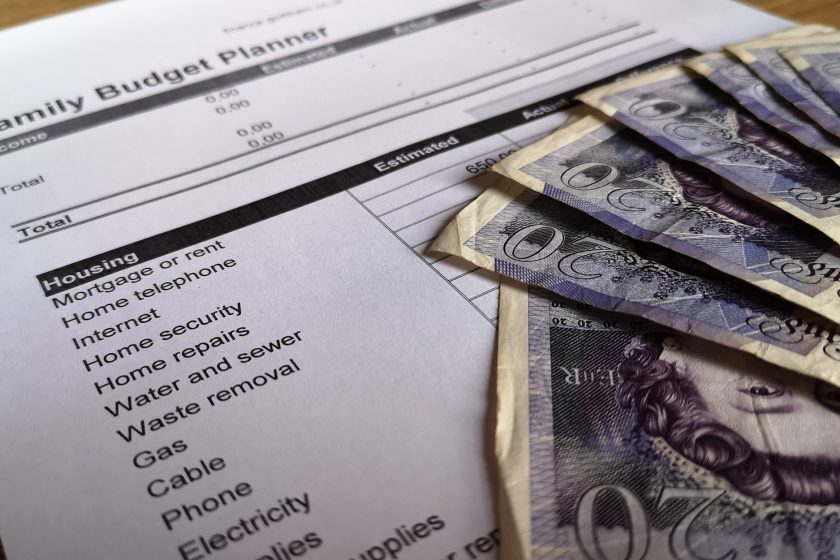
How to plan your home budget better in 2020
Be aware of credit cards
Credit cards can create enormous financial problems for consumers who use them without a plan. And with New York Fed data showing that American credit card balances increased by $13 billion in the 3rd quarter of 2019, high interest, unsecured debt is a still-growing problem. What’s worse is the fact that the average credit card APR is currently over 17%, making it difficult for consumers to make a dent in their balances as interest balloons.
For a lot of people, the answer to avoiding the pitfalls of credit is simple. They should consolidate debt at a lower interest rate using a balance transfer credit card or personal loan, create a plan to pay off all debts as soon as possible and stop using credit altogether. For those who fear they’ll remain tempted to spend, cutting up cards or freezing cards in a block of ice might be smart and necessary.
But not everyone needs to avoid plastic or take drastic measures to move their credit cards out of sight. It’s possible to enjoy rewards and consumer protections without racking up debt or ruining your financial goals. You just need to have a plan and some discipline in how you spend and pay your bills. If you’re eager to make the most of credit cards this year, these tips can help. Start Using a Monthly Budget
Be smart use – Monthly Budget
Using a monthly budget is a smart idea whether you use credit or not, but a budget is essential if you’re worried about credit card debt. Keep in mind that a budget is nothing more than a plan for the money you worked hard to earn. You have to budget for bills and regular expenses, but you can easily budget for some “fun” along the way.
How effectively plan your budget and control spending with pen and paper?
You can create a budget with a pen and paper by creating a list of all of your monthly expenses on one side of the page. You’ll include regular, predictable expenses like your mortgage, your car payment, daycare costs and insurance, but you’ll also add in anticipated spending in categories that fluctuate like groceries, utility bills and entertainment.
Make sure you also budget for debt repayment if you have debt already, as well as savings. To get ahead financially, you need to budget money to save and treat your savings as a priority. The opposite approach—spending whatever you want and trying to save whatever is left—doesn’t work very well.
In another column on the page, you should list the amount of income you plan to bring home for the month. In the end, your written budget might look something like this: Monthly Take-Home Pay: $5,600 Monthly Expenses: Mortgage: $1,600 Car Payments: $300 Insurance: $200 Groceries: $700 Dining Out: $500 Daycare: $800 Miscellaneous: $200 Personal Loan: $250 Student Loans: $400 Savings: $650
Total Spending: $5,600
Note that you don’t have to write a written monthly budget, either. You can use an array of online budgeting apps like Tiller, Mint or YNAB.com if you prefer to budget using the web instead of pen and paper. Set Spending Limits in Discretionary Categories
The key to budgeting better with a credit card in 2020 is making sure your spending stays under control and within limits you set. As you create your budget for the month, it makes sense to ask yourself if you’re spending too much in categories you have some control over.
For example, many families wind up spending more than they want to on dining out and groceries, where they could easily save some money each month by cooking more at home and strategically shopping for groceries. You may also find you’re spending more on entertainment than you really want to be once you take the time to go over your bills.
Either way, it’s smart to set reasonable limits for all the categories you spend money in each month. That way, you have a general framework to lean on as you strive to stick to your spending plan and reach your savings goals. Only Use Credit for Planned Purchases
With a budget and spending plan in place, you’ll want to use credit cards for all your planned purchases throughout the month. Not only is using plastic convenient, but it makes it easy for you to see where you’ve spent money all month since you can log into your credit card account at any time.
The key to getting ahead here is making sure you’re only using credit cards for regular spending and planned purchases. If you want to buy something you haven’t budgeted for and it’s not an emergency, you should plan ahead and budget for it next month.
The big exception here is miscellaneous spending, which is crucial to plan for. I’m not talking about deciding all of a sudden you need a new outfit for your office party. Instead, I’m talking about life’s many sudden expenses that tend to catch people by surprise.
That birthday party you forgot you need a gift for, that last-minute trip to the dentist and the oil change you desperately needed can easily knock your budget off track if you don’t leave any wiggle room for necessary but unplanned spending. That’s why you should set aside some money for “miscellaneous spending” in your budget each month. If you don’t have any surprise expenses, you can always allocate this extra cash to savings or move it into the next month’s budget. Track Your Spending Throughout the Month
You’ll also need to check-in with your spending throughout the month, which should be easy since you can log into your credit card account to see every purchase you’ve made. Take the time to tally up spending in discretionary categories like dining and entertainment throughout the month so you can know when you’re getting close to reaching your limits.
Once you do reach your limits in different categories, you’ll need to stop spending! This can be difficult if you spend your entire grocery budget by the 25th of the month but still need milk and bread, but the goal is learning to budget better and make your money stretch longer over time. Pay Your Credit Cards Off Several Times Per Month
Tip: Control your credit card spending – regularly
Another important tip: Log into your credit card account and pay your balances down to zero several times per month. Taking the time to pay your bill off will help you avoid debt in the long run, but it will also help you realize the immediate pain of your spending as you watch your money disappear from your bank account.
Remember, part of the reason using credit is so perilous is the fact that you can charge purchases all month long and you don’t have to worry about it until your bill arrives. By being proactive and paying off your purchases several times per month or even once per week, you force yourself to get real with your spending and part with your money all month long. Get Your Partner or Spouse on Board
Budgeting better in 2020 also requires you to get your spouse or partner on board. Obviously, it helps if your partner is also excited about your written budget and spending plan and if they’re willing to track their spending and stick with the limits you’ve worked hard to set together.
Fortunately, you can get your partner on the same spending plan as you by adding them as an authorized user on your credit card or having them sign up for their own. Some of the top travel and rewards credit cards even let you combine points in one account in the end for pricier redemptions. Examples include credit cards in the Chase Ultimate Rewards and Hilton Honors programs. Never, Ever Carry a Balance
Finally, this last tip should be obvious. If you want to budget with a credit card and actually wind up ahead, you should never, ever carry a balance on your credit cards. With interest rates as high as they are, credit cards can do a lot of financial harm when you use them as a short-term loan.
The best ways to use credit without carrying a balance are outlined above—for example, only use credit for planned purchases and pay your balances off several times per month. Creating a monthly budget, whether it’s written or made with a mobile app, can also go a long way toward helping you realize the benefits of credit without racking up debt.
However, don’t beat yourself up if you find that none of this works for you. The reality is that, for whatever reason, some people have a hard time avoiding debt with credit.
If you don’t think you can stick to a budget or pay your bill in full each month, or if you have tried and failed several times, it’s possible you should skip credit and budget using cash or a debit card instead.
That is not all – be smarter with your house finance strategy and budget planning
There are also several more things that you can to for better & smarter money spending and budget planning. Soon we will publish another article in that matter.
See you later!


